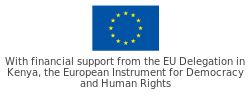
Microsite Strenghtening HR Kenya
Introduction
Kenya has ratified all of the key international human rights treaties guaranteeing the respect of human rights within detention facilities. It also enshrined most of the key global human rights principles within its 2010 Constitution. However, despite the presence of a fairly comprehensive legislative framework, implementation of human rights enforcement mechanisms remains poor in Kenya. This poor implementation increases the likelihood of human rights violations within Kenyan correctional facilities.
Within this context, the project ‘Strengthening Human Rights within Correctional Facilities in Kenya’ aims to eradicate all forms of human rights violations within detention and custodial facilities in Kenya.
Utilising the wide experience of the project coordinator, the European Committee for Training and Agriculture (CEFA), and the other partners from the justice administration and penal reform sector in Kenya, the project intends to protect detainees’ human rights by promoting policy dialogue, advocacy and support of Kenyan Human Rights Defenders (HRDs) to ensure effective law enforcement. The project addresses the issues of delayed reforms and fragmented intervention by strengthening the HRDs’ role and their coordination with different authorities through an inter-agency approach, alongside improving monitoring processes in correctional facilities. The Justice System’s National Plan on Human Rights and its policy and advocacy components have supported systemic and integrated coordination among the main HRDs, dealing with administration of justice in Kenya and spearheading the actual implementation of existing delayed reforms.
As a project partner, the IJJO has published an analysis of human rights violations within correctional facilities in Kenya, titled 'Human Rights and Deprivation of Liberty in Kenya: An analysis of the human rights’ situation and guidelines for an internal monitoring system'. Within the framework of this publication, the IJJO has also developed guidelines on best practice of monitoring and reporting human rights violations, created in the course of the project within Kenyan detention facilities. The main purpose of this publication is to provide evidence-based recommendations on human rights protection and violation prevention. This aims not only to support the implementation of the project itself, but also to support institutional authorities, policy makers and practitioners in the construction of evidence-based action plans and the establishment of effective monitoring and reporting systems.
Download the report: 'Human Rights and Deprivation of Liberty in Kenya'
